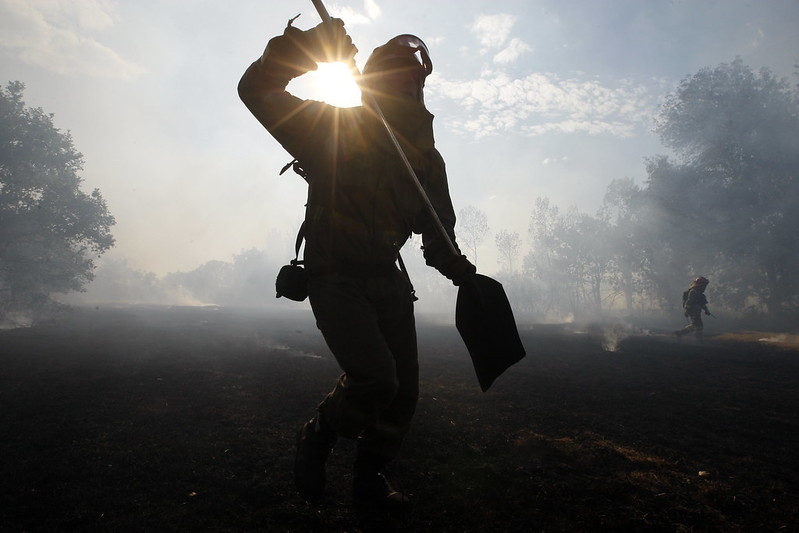Five projects led by UCLA investigators have received grants through a partnership between the University of California and the state intended to spur research and real-world solutions that tackle the threat of climate change throughout California.
In all, $83.1 million in California Climate Action grants have been awarded to a total of 38 projects involving researchers from across the UC system, as well as California State University campuses, private universities and community, industry, tribal and public agencies. The two-year grants are part of $185 million allocated by the state for UC climate initiatives that advance progress toward California’s climate goals.
“As the state’s preeminent research institution, the University of California is proud to partner with the state to pursue our shared climate goals,” UC President Michael Drake said in a statement. “The innovations catalyzed by the Climate Action awards will make all of our communities safer, more sustainable, and more resilient. I am grateful to the state Legislature and Gov. Newsom for providing funding to support this critical research on climate change in California.”
The UCLA-led projects and awardees are:
Health and safety of migrant workers responding to climate-related disasters
Investigator: Kevin Riley, director of UCLA’s Labor and Occupational Safety and Health program
Led by Riley, this collaboration among occupational health researchers and day-labor worker centers aims to develop insights to protect the health and safety of migrant workers, who have played an increasingly prominent role in responding to the nation’s climate-related disasters and recovery efforts. Such workers, who often help to remove debris and to demolish damaged structures after wildfires, earthquakes, storms and floods, are frequently exposed to unique job-related hazards — risks that are worsened because they have limited legal protections and are often subject to labor exploitation. Grant amount: $2 million.
Community-driven electric vehicle charging
Investigator: Yifang Zhu, professor of environmental health sciences, UCLA Fielding School of Public Health
To help reduce greenhouse gases, Zhu and scholars from UCLA and Cal State Northridge aim to develop solutions to enable residents of disadvantaged communities to more readily adopt electric vehicles. Currently, the use of EVs in these communities has been limited by a number of factors, including a lack of access to charging stations. The researchers will work with local residents and community-based organizations to identify these barriers, improve knowledge and awareness of EVs, and design plans for deploying and installing charging stations in underserved areas. This project also received an additional grant of $20,000 in recognition of its community engagement objectives. Grant amount: $1.99 million.
Respiratory protection for firefighters in wildlands
Investigator: Rachael Jones, professor of environmental health sciences, UCLA Fielding School of Public Health
Respirators are the primary means of protecting firefighters from inhaling toxic combustion products. In remote wildland areas, however, where climate change has increased the incidence of fires, firefighters often work without respirators because of the devices’ limited air capacity and a lack of extra air bottles. Jones and her colleagues will evaluate several prototypes of powered air-purifying respirators to determine whether they should be adopted by wildland firefighters. The research will be conducted in partnership with the Los Angeles County Fire Department, and the results will be used by Cal/OSHA. Grant amount: $1.98 million.
Battery electrodes for grid-scale energy storage
Investigators: Yuzhang Li, assistant professor of chemical and biomolecular engineering, UCLA Samueli School of Engineering; and Richard Kaner, professor of chemistry and biochemistry, and Dr. Myung Ki Hong Professor of Materials Innovation
Li and Kaner will lead an investigation intended to advance grid-scale energy storage — including energy from renewable yet intermittent sources like solar and wind — that could help the state achieve a carbon-free electric grid. Specifically, the team plans to develop a high-capacity cathode material using a technique called laser-scribed synthesis, and to demonstrate its capabilities using cryogenic electron microscopy, or cryo-EM. Grant amount: $1 million.
Rising sea levels, earthquakes and soil liquefaction
Investigator: Scott Brandenberg, professor of civil and environmental engineering, UCLA Samueli School of Engineering
Brandenberg’s project will address the growing hazard of earthquake-induced liquefaction caused by rising sea levels. When shaken by quakes, water-saturated soil in coastal areas loses its density, posing a danger to infrastructure like roads and buildings. Investigators will use groundwater modeling, sea-level rise projections and other analyses to map the severity of this threat in California. Their map will be coordinated with the California Geological Survey, the California Seismic Safety Commission and the U.S. Geological Survey and will be used in part to assess liquefaction hazards to proposed new developments throughout the state. Grant amount: $520,000.
Sean Brenner | August 31, 2023 | UCLA Newsroom
More information at: https://newsroom.ucla.edu/releases/ucla-led-climate-projects-state-funded-grants
Photo by Carlos Cortés López

